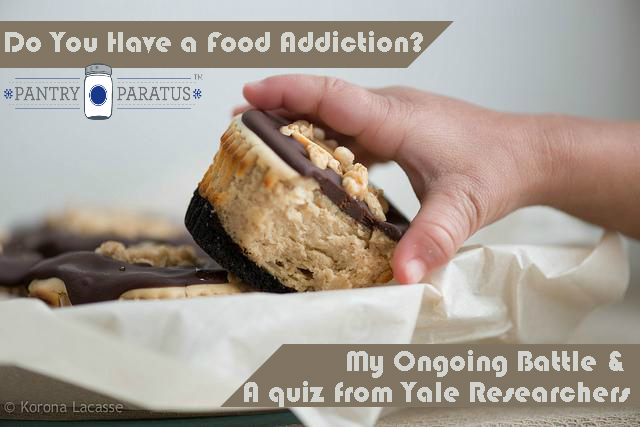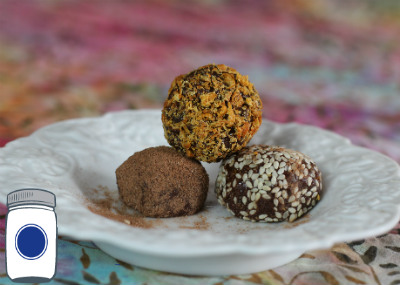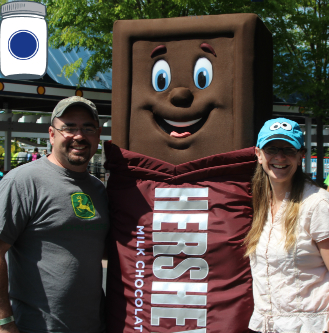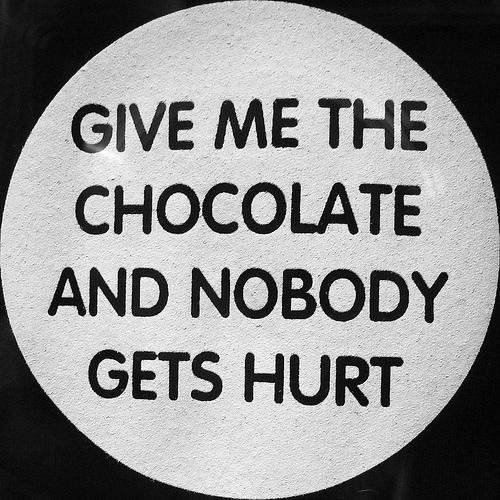Do You Have a Food Addiction?
My Ongoing Battle and a Quiz from Yale Researchers
Proviso: Nothing in this blog constitutes medical or legal advice. You should consult your own physician before making any dietary changes. Statements in this blog may or may not be congruent with current USDA or FDA guidance.

Here is some trivia about me.
In my former life (before children) which was I?
Professional piroshky maker (read about that experience!)
Vinyl reupholsterer (great flavor, that vinyl)
A shrink.
Well, sort of a shrink. Not an official one; I was a licensed psychologist’s assistant, which means I did the work and he signed his name on the bottom so we could bill insurance. Oh and the malpractice insurance was rather high. Probably not as high as it would be if they had malpractice insurance for parenting, which is my current occupation. I have a master’s degree in psychology, which qualifies me for absolutely nothing, by the way, except having lots of opinions about the motivations, fears, and comforts people experience in daily life.
Today’s blog comes from life experience, not from a stuffy textbook.
I have an addiction.
Chocolate.
As with most addictions, I should really say that I am a recovering addict because even though there are times in life when it seems I got ‘er licked as it were, it will once again rear its ugly (melty, gooey) head when I am least vigilant.

No-Bake Truffle using only 4 ingredients (whole food recipe)
Long before children, long before that crazy psychology degree actually, I discovered that people knew me for my love of chocolate. When I quit a job to go back to school, the co-workers went in together and bought an insane amount of it for a going-away present. In that same week, my childhood-best-friend’s father was flying through our town. We met him for an hour in between his flights, and he handed a bag of chocolate to me:
“I wanted to get something for you, but all I could remember was how much you loved chocolate.”
Wilson snickered. Sure, laugh it up, but I don’t see you refusing our chocolate stash, which now overflowed the pantry shelf and onto the counter.
I then read a really dumb book, you know the kind. The author had one brilliantly valid point to make, but after making it on the first page he spent the next 212 regurgitating it. The book was about the connection between food and love (or something like that) and how we often turn to food to fill an otherwise void area in our hearts. So I did the hard work of self-examination, and then swore off chocolate.
The first week was the hardest; it was also my birthday week (my timing has always been like that). My best friend surprised me with a chocolate cake (hey, I wasn’t quick to denounce chocolate out loud lest someone hold me to it).
Okay, so the NEXT first week was the hardest.
Over time, I quit thinking about M & Ms all of the time like a junior high crush. Yes, I broke off my relationship with chocolate. And then it got to where I could even be in the same room with it at social functions. Eventually, I was enjoying alternative foods more and realized how much I was missing out with my monochromatic obsession with the Dark. And one day I realized, I much preferred the flavors and textures of other offerings and I was not even missing it, really. I knew I was going to be okay. Do you know that it took over 3 months to get there?

Am I addicted?
Well, apparently, I personify chocolate and have been known to hug it.
And the muppet to which I most closely identify is Cookie Monster.
I did eventually allow chocolate back into my life, but never in the house (word on the street was that Wilson had his own private hiding place for it). I could eat a modest piece of someone else’s cake, or a scoop of gelato. This was a healthy relationship.
Today as I write this, I am distracted by chocolate. I am– as I occasionally do– fasting it. I do this in part to see if I can live without it. If I cannot, then I need an intervention. I am confessing it; I need an intervention. My timing is poor; there is chocolate chip cookie dough in the fridge and I’m making a very chocolatey cake for my son’s birthday in a few days.
So where does this obsession with the beany-brown bar come from, why does it plague women across industrial nations? Can’t I just have my Ghirardelli’s and eat it too? Am I really “addicted?”
Harvard Medical School said that yes, I am addicted. Well, they were not talking to me personally, but I do meet the criteria they set forth below.
There are three essential components of addiction:
- intense craving
- loss of control over the object of that craving
- continued use or engagement despite bad consequences.
By that definition, addiction can move beyond chocolate or coffee, and can even mean that bag of potato chips or those choco-mallow-puff-fluff some people call breakfast.
Emotionally, we may use food as a reward (i.e., “I’ll eat that after I clean the kitchen”) or to alleviate emotional distress (i.e., ordering pizza to overcompensate for a bad day). The emotional reactions are probably first in the physiological chain reaction that ensues, but there is indeed a physiological response in the body to these foods! These foods affect the blood oxygen level and can be responsible for the release of dopamine very similar but on a different level than drug addictions (Gearhardt, et al, p. 809). In turn, the dopamine plays with Leptin levels, the chemical (peptide) regulator that alerts you that you are full (Grosshans, et al, p. 530). Leptin levels can change without taking a single bite, but by merely seeing a picture of a juicy burger or a candy bar. Just as food affects us psychologically and physically, it can also affect us behaviorally. It determines what we purchase when, and whether we are going to finish the to-do list to get our Pavlovian reward.
What This Means
Well, I suppose we are all in good company, if the line at the local Starbucks or the annual revenue of chocolate companies is any indication. The obvious first step is identifying foods that create a psychological, behavioral, or physical reaction in us. If I know that chocolate is my kryptonite and that by simply seeing it my body undergoes an addictive reaction, I am better prepared to guard myself against it. Remember, Harvard said that an addiction can be partly defined by our continuance of something harmful. And consuming entire bags of hydrogenated potato chips is not exactly in my best interest (no, I’m not a medical professional but I think we can call this one accurately). So, for me, it means never bringing those chips into my home. Ever. I also have very limited exposure to a television screen –we don’t own one—and so that Wendy’s Frosty commercial will therefore not entice me to jump in the car and indulge. I remember doing that many years ago!
Sometimes we need to look in the proverbial mirror to reexamine where we stand with things. I found the Yale Food Addiction Scale for you to use as your mirror, if you want. I give it to you in the spirit of self-reflection, not as any form of medical, psychological advice. There is no rating given at the link above, but it might be helpful to fill this out and take with you to your next medical appointment for a professional to evaluate.
I cannot set forth a plan to help you overcome a food weakness. You could benefit from nutritional counseling and medical assistance if this is affecting your weight, health, or quality of life. But if you find yourself licking the lid to the ice cream carton and think, “golly…I did it again,” I hope this quick insight helps you. Let’s make conscientious food choices so that we can live nourished lives, inside and out.
On the Long Road to Recovery,
Chaya
Proviso:
Nothing in this blog constitutes medical or legal advice. You should consult your own physician before making any dietary changes. Statements in this blog may or may not be congruent with current USDA or FDA guidance.
Sources:
Can you become addicted to chocolate? – Harvard Health Blog. (n.d.). Harvard Health Blog RSS. Retrieved June 22, 2014, from http://www.health.harvard.edu/blog/can-you-become-addicted-to-chocolate-201302145903
Gearhardt AN, Yokum S, Orr PT, Stice E, Corbin WR, Brownell KD. Neural Correlates of Food Addiction. Arch Gen Psychiatry. 2011;68(8):808-816. doi:10.1001/archgenpsychiatry.2011.32.
Grosshans M, Vollmert C, Vollstädt-Klein S, et al. Association of Leptin With Food Cue–Induced Activation in Human Reward Pathways. Arch Gen Psychiatry. 2012;69(5):529-537. doi:10.1001/archgenpsychiatry.2011.1586.
Photos:
“Just one, please!” (hand on cupcake) is by Korona Lacasse (cc), changes by Pantry Paratus.
“Give me the chocolate“procsilas via photopin cc
Looking for more about chocolate?
Chocolate, Part 2 (How It’s Made)
Using Cacao Part 1: Is Cocoa Powder & Cacao Powder the Same Thing?
Using Cacao Part 2: Chocolate By Any Other Name (Chocolate Defined)

